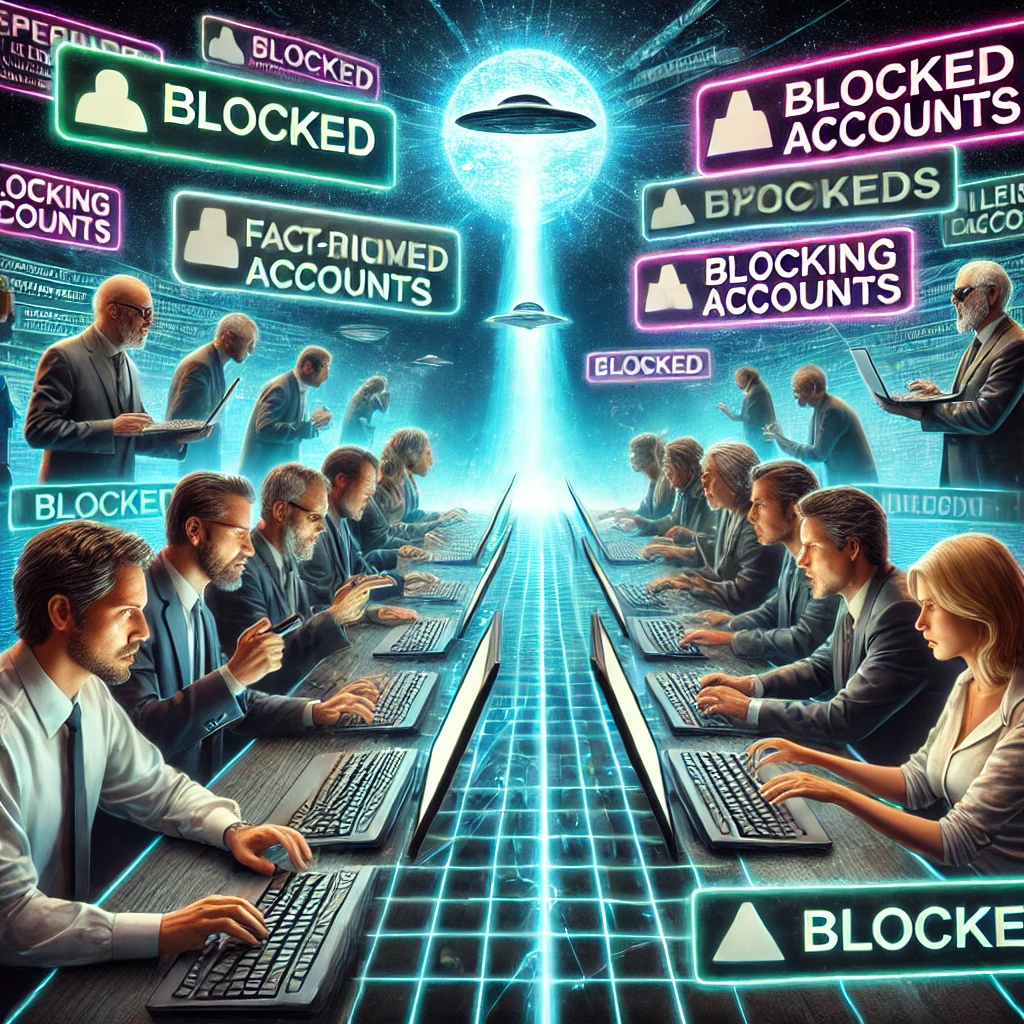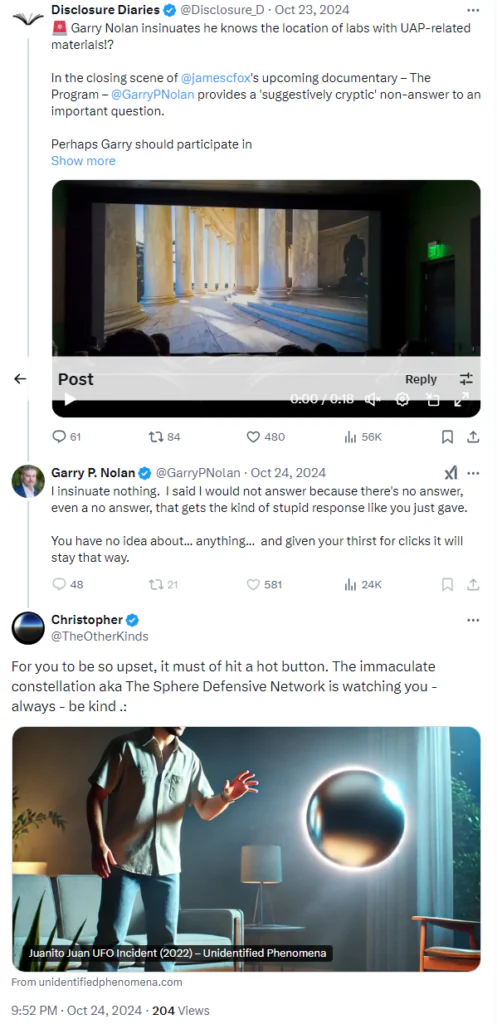Why the UFO Community is at War with Itself

Can you imagine being a world dictator, where every post you make is met with nothing but agreement, not because everyone genuinely supports you, but because you’ve systematically erased all dissenting voices? In this scenario, blocking doesn’t just silence critics—it creates an illusion of consensus, a controlled reality where opposing perspectives are erased before they can challenge the dominant narrative. Worse still, those who have been blocked don’t just lose access; they are often penalized, shadowbanned, or labeled as disruptive, further marginalizing alternative viewpoints.
This is the dystopia we now inhabit—a world where curated reality replaces objective truth, and dissent is quietly erased rather than debated. Much like Aldous Huxley’s Brave New World, where societal control was maintained not through brute force but through pleasure, distraction, and conditioning, today’s digital platforms manufacture compliance through convenience. When everything we see is filtered to align with our preferences, and every opposing thought is silenced, there is no need for overt oppression—people willingly accept the illusion as reality. In a world where algorithms dictate what is “acceptable” and what is “dangerous,” independent thought becomes an act of defiance. This mirrors the themes explored in Early Warning (1981), a film that eerily predicted a future where control is exerted not through direct authoritarianism, but through the slow erosion of independent thought. The suppression of dissent, the manipulation of narratives, and the consolidation of media into a tool for ideological reinforcement all serve the same purpose: to ensure that no one asks the questions that truly matter.
Yet, this manufactured consensus is fragile. The UFO community, like society at large, finds itself at a crossroads—either embrace the discomfort of true discourse or succumb to the sedative of controlled thought. When voices are silenced instead of challenged, when narratives are curated instead of questioned, the real battle isn’t just about UFOs or disclosure—it’s about whether people will fight for the right to think freely at all.
When someone blocks you online, it usually means something hit a deep chord—whether it challenged their beliefs, struck a nerve, or sharpened them in a way they resisted. As iron sharpens iron, so one person sharpens another. Challenges, even uncomfortable ones, help refine and strengthen us. If something provokes a strong reaction, it might be because it’s revealing an uncomfortable reality—Then you will know the truth, and the truth will set you free.
The real question, then, is how to respond: do you block back, reinforcing the divide, or do you take the higher path and turn the other cheek? Blocking isn’t just a digital action—it can be a reflection of deeper spiritual and ideological separations, shaping how we engage with truth, power, and each other. And in a community that claims to seek truth, what does it say when people refuse to even hear opposing views?


The UFO community has never been more divided, and the recent interaction between John Greenewald Jr. and Christopher (@TheOtherKinds) is a perfect example of this ongoing war. Greenewald, a staunch advocate for hard evidence and government documents, dismissed the latest “UAP Retrieval” footage as another case of overhyped disappointment, while Christopher defended it as misunderstood, sharing a link to deeper analysis. Instead of a constructive debate, Greenewald blocked Christopher, a move that reflects a growing trend in the digital age—where ideological clashes often lead to digital excommunication rather than dialogue. But how can someone be a truth advocate when they can’t even handle a tweet?
This clash highlights an uncomfortable truth—many in the UFO community aren’t just debating the evidence; they’re defending their worldview. The footage in question, reveals a whistleblower’s account of a secret U.S. UFO retrieval program, complete with video evidence. But instead of rallying around the search for truth, the community fractures along familiar lines: some demand ironclad proof, others see patterns and hidden meaning, and both sides accuse the other of hurting the cause. Greenewald’s reaction—blocking rather than engaging—mirrors a broader issue: when faced with something that challenges established narratives, do we dismiss, do we engage, or do we shut the door entirely?


Garry P. Nolan blocking Christopher (@TheOtherKinds) mirrors the broader dystopian trend of shutting down uncomfortable conversations rather than engaging with them. In this case, Christopher wasn’t even the original critic—he was defending another member of the community from Nolan’s dismissive response. Nolan, in his heated reply, rejected the claim that he insinuated knowledge of UAP-related labs, snapping back with “You have no idea about… anything…”—a reaction that suggests the discussion struck a nerve. If there was truly nothing to hide, why such an emotional response? And more importantly, why shut down someone who wasn’t even making the claim, but simply advocating for fair discourse?
This is the same pattern seen throughout the UFO discourse: instead of addressing difficult questions, figures at the center of the conversation are increasingly choosing to block, dismiss, or ridicule inquiries outright. Rather than debate the substance of Christopher’s remarks—or even the underlying theme of Immaculate Constellation and the Sphere Defensive Network—Nolan’s reaction was digital excommunication, ensuring that the conversation could no longer continue. What does this say about the state of “truth-seeking” if those most vocal in disclosure refuse to be questioned—not just by critics, but even by those who defend open discussion?
The act of blocking isn’t just about filtering noise; it’s a deliberate curation of what voices are allowed in the discussion. This ties back into the “Blocking Souls” concept, where social media has become a tool not for bridging understanding, but for dividing perspectives. Christopher’s intervention was an attempt to restore balance—to keep the conversation alive. Yet instead of engagement, the response was rejection. In a world where controlling the narrative has become more important than discovering the truth, the real disclosure battle isn’t just about UAPs and government secrecy—it’s about who gets to participate in the conversation at all.
Richard Dolan, one of the true voices of reason in this community, exposes the deeper layers of deception that shape not only the UFO narrative but society as a whole. In his discussion “Escaping Illusions About Ourselves and Aliens,” he examines the challenge of understanding UFOs, emphasizing that the phenomenon involves advanced intelligences operating with their own agendas, often beyond human comprehension. He critiques the secrecy maintained by governments, particularly the United States, which deliberately restricts public access to crucial information. Dolan argues that this secrecy reflects a much larger problem—the carefully crafted illusions under which society operates, including the false perception of freedom and progress. Many believe they have access to the truth, yet their reality is manipulated, their choices guided, and their understanding of the world subtly controlled. This illusion keeps people compliant, leading them to overestimate their ability to uncover hidden knowledge. By challenging these deeply ingrained assumptions, Dolan encourages individuals to break free from the barriers imposed on them, allowing for a more honest and unfiltered approach to both disclosure and the greater truths that shape our existence.
The question remains: Is the search for truth really about finding answers, or has it become a competition to control the narrative?


